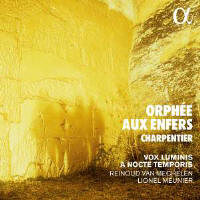Texte paru dans: / Appeared in: |
|
|
Appréciation d'ensemble / Overall evaluation :
|
|
|
Reviewer: Kate Bolton-Porciatti Charpentier's two works inspired by Ovid’s retelling of the myth of Orpheus make for a captivating diptych. The three-voice cantata Orphée descendant aux enfers is a masterpiece of poetic concision, painted in soft sfumato shades, while the (probably incomplete) two-act chamber opera La Descente d'Orphée aux enfers captures the intensity and latent tragedy of the myth with slender resources and the subtlest of gestures. In both works, Charpentier’s yearning melodies and wistful harmonies are always tempered by French Baroque etiquette.
It’s hard to follow Les
Arts Florissan1s's classic 1996 account of La Descente which pairs the
young, velvet-toned tenor Paul Agnew with the sensuous soprano of Sophie Daneman,
but this new recording is every bit as beautiful. Haute-contre (high tenor)
Reinoud van Mechelen is a seductive Orpheus - small wonder that his limpid,
pliant, expressive voice and eloquent diction enchants both his nymph-bride
Eurydice (brought to life here by the dewy-voiced Déborah Cachet) and the god
Pluto, (stylishly sung by Geoffroy Buffière). Mechelen also co-directs (with
Lionel Meunier) the period ensemble A Nocte Temporis, and the sensitive
interplay of voices and instruments has all the intimacy of chamber music
(fitting for a work originally performed in the private salons of the Parisian
Duchess of Guise). The players offset the pastel colours of the operas pastoral
opening with the sombre shades of Inferno, and they thrillingly evoke the
dancing of nymphs, shepherds and phantasms with playing that turns from graceful
to furious. Alpha Classics’s recording is luminous and detailed.
| |
|
|
|
|
|
|
|
Cliquez l'un ou l'autre
bouton pour découvrir bien d'autres critiques de CD |
|




